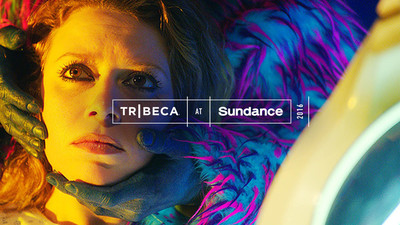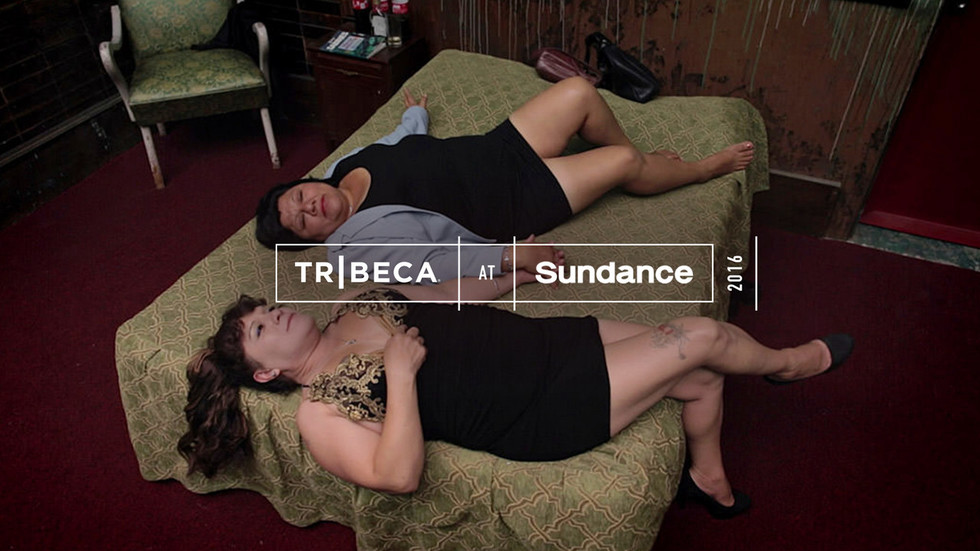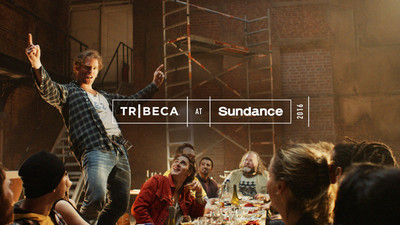
BY MONICA CASTILLO |
PLAZA DE LA SOLEDAD Director Maya Goded Intimately Tackles Sexuality and Aging In Sundance Doc
Photographer turned documentarian Maya Goded follows several veteran sex workers in Mexico City as they share candid stories about their on-the-job experiences.

You've never seen a documentary quite like Plaza de la Soledad. Tribeca Film Institute grantee Maya Goded's first documentary follows a topic she’s been photographing for over 20 years. With an all-access look into the lives of women like Carmen, Lety, Raquel, and Esther, Goded turns her lens to Mexico City's prostitutes, who, after learning to trust and welcome Goded’s presence, open up about their lives, dreams, and troublesome clients.
The women featured in Plaza de la Soledad, which premiered at this year's Sundance Film Festival, may not fit your definition of what a prostitute should look like. All of Goded's leading ladies are over 50 years old, yet they probably have more confidence than your average supermodel. The women are comfortable in their bodies and openly discuss their sexuality with Goded. (And in one case, one woman does so in front of her husband).
In its own quiet way, Plaza de la Soledad is definitely more than meets the eye. Last week at Sundance, Goded discussed her life’s work with TribecaFilm.com.

What’s it like to bring a story you've worked on for so long to a major film festival?
I come from another world as a photographer. So when I was filming the documentary, I wasn't thinking about which festival to go to. My husband is an actor, so I know there are a lot of festivals. Last year was complicated with personal problems, finishing the movie, and showing the movie to the women who are its protagonists. My producer was the one who submitted the film. They called me to let me know they picked my film, and it was a complete surprise!
I was quite happy because I've spent so much time on this project. I've known these women for more than 20 years, and that means something to me. This is a theme I've worked a lot on. I've been very emotional taking my film to the United States, listening to the audience reacting to my movie.
When did you officially start filming?
I started filming four years ago, but I've been photographing them for over 20. I spent a year and a half in editing. It was hard building the movie together.
I love how you include these little personal moments between the women in their off hours. How did you decide on which scenes to keep?
I worked with editor Valentina Leduc to assemble the story. We worked with the most important themes first as a guide for the various stories. Nearly all of the women have similar arcs: abandoned young, poor, and obligated to work as a prostitutes by either themselves or a man in their life. They think this is the only option.
You've mentioned that the themes of Plaza de la Soledad are very important to you. Can you explain more about which themes stand out to you the most in your new film?
What’s important to me is the beauty and sexuality of these women. They're older women, and I love to see them how they feel about their bodies. The women who dedicate themselves to prostitution are very confident in their bodies and accept their age. I like talking about the sexualities of older women because it’s so taboo.
I started this work because in one series of photos I took of this zone, there's one photo in particular I loved that features Juanita, one of the older women who’s about 70. She's in her bed with a client she's had for over 50 years. That photo bothered a lot of women. "How could an older woman continue working and having sexual relations?" All of that helped me decide I needed to tell this story.

The movie’s themes are universal. Prostitutes work around the world, often in the center of cities. We often don't see them, but they also have stories. While I was living in Madrid, I found a street identical to the street in Mexico that was populated by mostly older sex workers. I believe this is a very Mexican story, in that these women's stories happen in Mexico City, and that is the heart of who we are as Mexicans. And in that square, all of these stories happen. We all pass by, and we've all walked those streets.
The first time I stopped at the plaza, I spent a lot of time there. You stop more when you have a camera. That’s when I noticed the neighborhood and the women who were working as prostitutes. At first it was hard finding women who would do the movie, but I began to start working with ones who were there full-time. Some women do prostitution on the side to make ends meet, and they hold day jobs for most of their time.
Tell me about one of the first times you met these women. How did you broach the topic of filming them?
I met Carmen, one of the protagonists of the movie, through one of her friends. First, I met Evelia in the street when I was pregnant. She told me once I had my baby to find her, and she gave me the directions to her house. I returned after I had my baby and found her at home. That's when she introduced me to Carmen, and I’ve enjoyed working with her since. She has no education, wasn't able to study; they robbed her when she was 10, and she became a mother at 12. But she's very intelligent, and she surprised me by that. Her capacity to love things impressed me.
I took a few photos of her and her friend. I asked if I could then take a photo of her and her client who wouldn't mind. She told me she knew a client she liked very much and would ask him. He said yes, and she introduced me to him. That client, Carlos, is the one you see in the movie, and I knew him back when he was only her client! They married, and I was their maid of honor. They later divorced, but reunited during the making of the movie. For me, that’s something sentimental. It was important for me to include that relationship.
I've taken many difficult pictures of migrants and separated families, but because of the themes behind this movie, I always find someone who wants to share their story. You'll find people who want to invite you into their lives. That’s very beautiful; it’s almost like magic.
Tribeca partnered with Remezcla to cover Latino talent at Sundance. Check out a clip below.
Plaza de la Soledad is the recipient of a 2013 grant from Tribeca Film Institute Latin America Fund.
te

